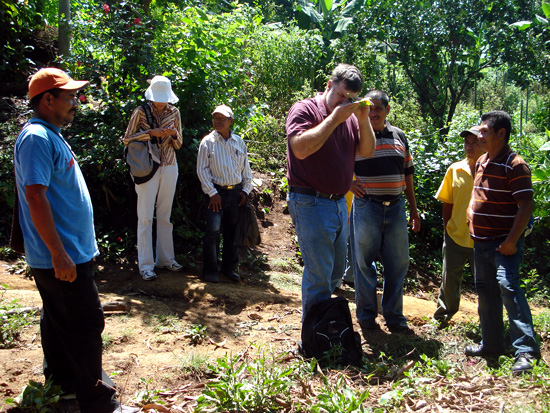UK specialists reach out to farmers worldwide
UK specialists reach out to farmers worldwide

Specialists with the University of Kentucky College of Agriculture regularly help Kentucky farmers find solutions to production problems, but their influence goes way beyond the Bluegrass. A UK entomologist and horticulturist recently worked with the United States Agency for International Development through Winrock International to carry out two humanitarian missions.
Ric Bessin, UK extension entomologist, recently returned from El Salvador, where he showed groups comprised mostly of limited resource farmers how to conduct their own on-farm research on organic crops and improve overall farm sustainability.
“Most of the farmers in this area are dependent upon what they can grow themselves,” he said. “They want to reduce their reliance on external inputs and test locally derived materials for crop production and as supplements to animal feed.”
Bessin also taught the growers about controls in experiments, how to set up those in fields and record the results. Each group of farmers was testing different crops and ideas.
The project is coordinated through FUNDESYRAM, a local nongovernmental organization that supports community and social development in the region. He also interacted with the University of El Salvador and CENTA personnel, the country’s version of the U.S. Department of Agriculture, to identify ways to continue to support the farmers’ efforts.
“Ultimately, the farmers want to produce a surplus of crops so they can sell the excess locally,” he said. “Food security is a big issue there.”
This was the fifth time Bessin, who was born in Venezuela and spent some of his childhood in Honduras, has worked in Latin America with this organization. The previous four times, his work involved helping individuals with insect management and pesticide safety.
“I enjoy the culture, volunteering and helping people,” Bessin said.
Like Bessin, Tim Coolong, UK extension specialist for vegetable crops, was interested in international development, and Bessin helped him connect with Winrock International and USAID. Coolong was assigned to Lebanon and worked with mainly commercial vegetable growers to develop fertilizer recommendations.
“Growers in the region I was placed worked through their local chamber of commerce, which houses their version of Cooperative Extension,” he said. “There, growers can have soil samples tested at a local university, but the university only gives them the results of the soil test and not nutrient recommendations.”
Coolong helped them develop nutrient recommendations and a calculator based on their soil conditions, crops and seasons.
“Actually, the area I was in (northeastern Lebanon) had very similar temperatures to Kentucky, although, they had a heavy clay soil with an average pH of 8.5,” he said.
The Lebanese growers used plastic tunnels to grow tomatoes in the spring and leafy greens in the winter. Their field crops included potatoes, cucumbers, bell peppers, lettuce and winter wheat as a cover crop. Most of the growers were producing these crops to sell, and a few of the larger growers were exporting to Mediterranean countries in southern Europe.
“I was surprised at the diversity of things going on there,” Coolong said.
Coolong and Bessin are both interested in further international outreach opportunities, and Bessin is hoping to follow up with the El Salvadoran growers next year.
Community & Leadership Development Entomology Extension Horticulture Research


